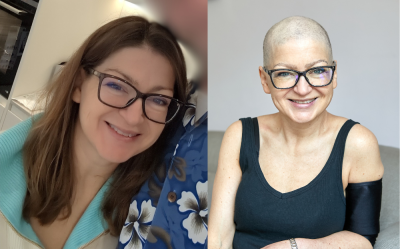
The Royal Free London (RFL) has become the first NHS trust in the UK to offer an in-house eyebrow microblading service to patients with cancer thanks to funding from the Royal Free Charity.
Patients attending the Royal Free Hospital’s breast clinic for chemotherapy can now be referred to the charity for microblading at the hospital, to help with the effects of eyebrow hair loss. Microblading, a semi-permanent technique, uses pigment to create hair-like appearance on the skin which can last up to three years.
Therapist Robyn Althasen has joined forces with the Royal Free Charity to offer the make-up technique, where patients can receive the treatment at the charity’s on-site complementary therapy rooms or at her own clinic on Harley Street. Robyn has adapted her procedure, allowing her clients to consult their hospital care team when scheduling their recommended second procedure, to fit around their chemotherapy treatment.
Wendy, from Muswell Hill, was the first patient to receive the RFL complementary service. She said she had heard of microblading before, but had never considered it until learning that she would likely lose her eyebrows during chemotherapy.
“I had to arrange my first and only session in advance of my first chemo session to allow enough time to heal,” Wendy explained.
“Timing was a little tricky as I was also keen to spend time with my young family over half-term before. Robyn was happy to help slot me in at a time that worked.
“I wasn’t getting it done in order to get perfect eyebrows, but just so my face would still look like my face when my eyebrows came off in due course. It's only now, in my fourth month of chemo that my eyebrows and eyelashes are coming out, which is slower than other hair loss.”
Wendy believes that the microblading has helped her feel like herself.
“I obviously don't know quite what I would have looked like without, but I am glad I went ahead with the microblading, especially now my real eyebrows have thinned. My brows help shape my face so I think it does help feeling like I'm still me.
“I think going through cancer treatment is such a challenge to anyone's sense of identity that anything that can be done to retain something akin to 'normality' is good to try. I'm really glad I had the microblading done before chemo, and really grateful for the support from the Royal Free London oncology breast cancer nursing team, and the Royal Free Charity.”
Speaking about the importance of acknowledging hair loss for patients, Robyn said:
“Clients are often confused why they feel upset about the potential hair loss when they think this should be a minor thing in the context of having cancer. But there’s a huge vulnerability that comes with losing your hair. It’s very emotionally challenging.”
Jon Spiers, chief executive of the Royal Free Charity, said:
“Cancer diagnoses in north London are projected to surge in coming years.
“Against this backdrop, our role as the Royal Free London's charity partner is more crucial than ever before. By delivering services that would otherwise not be available, we’re making a direct and meaningful contribution to the experience of patients with cancer.
“Last year, we became the first NHS charity in the country to deliver scar tissue massage to patients undergoing cancer surgery to help their physical and psychological recovery. At the same time, we introduced virtual reality therapy for patients receiving treatment at Chase Farm Hospital’s chemotherapy suite.
"Now, we’re extending our services to include microblading for patients with breast cancer. We know that treatment-induced hair loss is very distressing. Thanks to the generosity of our supporters, we can help patients facing the loss of their eyebrows.”
We are one of the largest providers of cancer services in the NHS, receiving almost 50,000 cancer referrals each year. We work in close partnership with the Royal Free Charity to provide opportunities, such as microblading services, to develop cancer services and patient experience.
- Cancer is one of the three pillars of the recently launched five-year clinical strategy for the RFL. Learn more.
 Translate
Translate